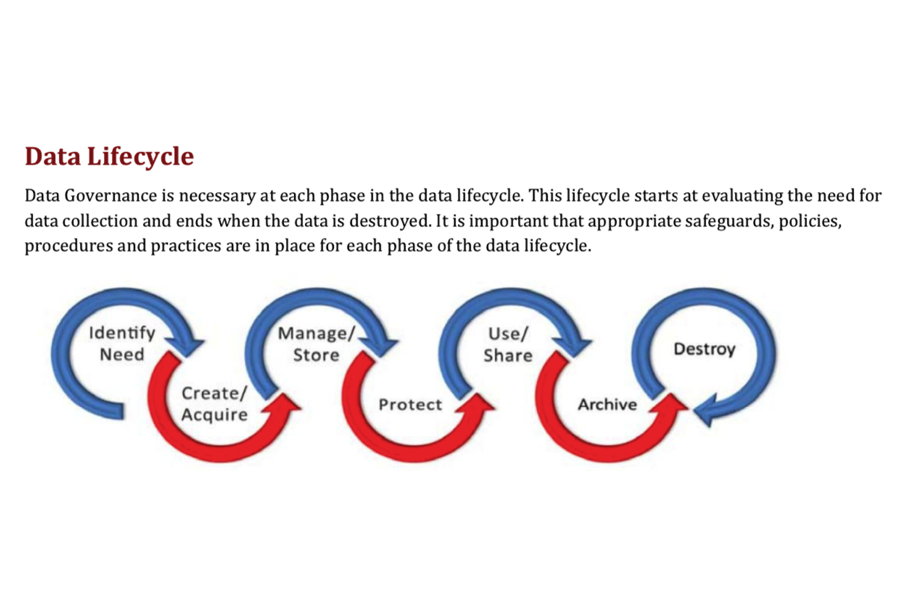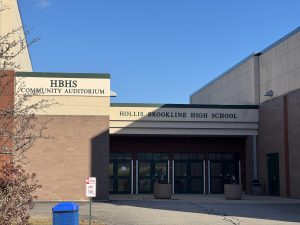Becoming Law
This picture is part of the data governance plan. It explains their data sharing plans and how they must destroy data it collects as a school. “When it’s in effect as a law I am going to follow it,” said Bergskaug.
January 14, 2020
On Jun. 12, 2018, the New Hampshire state government signed a new data safety bill, HB 1612 , into law, which took effect on Aug, 11, 2018. With HB’s data governance team, the SAU 41 took on the task of adopting the new data governance plan. However, with all of the pieces involved, it can be hard to connect all of the dots.
The Hollis Brookline School Board got right onto constructing what would soon become the Data Governance Plan. Hollis Brookline worked closely with the Bedford School District during the drafting stages; Bedford having already been drafting for two years, HB started collaborating and exchanging questions, resources and ideas. In May of 2019, The Hollis Brookline Data Governance Plan completed the draft, and it was proposed to all three of the school boards. By June 2019, the data governance plan had been adopted into SAU 41.
“The data governance plan took us about a year to draft,” said Gina Bergskaug, Assistant Superintendent, “There is a lot of information out there and we have to protect our school and our students.”
After the new law took effect, many of the sources that were once deemed appropriate, now have to go through an extreme bootcamp to meet new criteria and standards. “Everything has to be vetted and approved,” said Bergskaug. Alongside this new law, web tools are starting to incorporate in their terms and agreements that students younger than a certain age should not be using their sites. The sites that do not fit in the age demographics of HB would be prohibited to student use.
However, with these new terms in place, there was some miscommunication along the way, which caused some confusion among teachers, making them believe that certain search engines, like Google, were completely prohibited.
Evidently, this is not the case. In order for students to be able to use open search sites like Google, parent permission is crucial. According to Bergskaug, “all of the tools that we use have to be on a list, and parents have to approve them.” Parents give their consent to the sources during the annual summer Powerschool registration, with Google as one of those pre-approved sources on that list.
“I do know in the community like Bedford and ours, if we aren’t on the front end of these type of legal issues, the most of the issues will come from our communities,” said Principal Rick Barnes. At the end of the day, the goal for HB was just wanted to make sure that students were safe in the research that they did.
But how has this influenced the way that teachers educate in the school? Having restricted class resources can really impact the way that a teacher will teach and review material. According to Jennifer Given, a World Studies teacher, the new law doesn’t accommodate for the way a classroom functions.
“I think the state had good intentions, but was overly broad in its description of what they were attempting to do,” said Given. “If you legislate on a topic that you don’t live everyday, it’s easy to make a mistake you didn’t see coming.”
Given also mentioned how difficult it can be to replace some of the now prohibited resources. This can be a struggle as the new source needs to meet the copious safety standards, as well as teach and review the same concepts as efficiently as previously used resources.
While the idea of the law was well-intentioned, it becomes extremely difficult to try and manage on a day-to-day basis. Particularly as a student, it becomes extremely difficult with the broad nature of the law. Sam Messina, ‘21 said, “It made my research a lot harder in trying to find resources.”
With a lack of communication regarding exactly what the law restricts, it can become very difficult to understand what frequently used sources fall under the category of “prohibited.” More specificity in the law, would allow for students to feel less restricted than the broad, current law that is in place, which gives students more access to other educational tools at home.
Editor’s Note: The data governance plan is currently under review according to Principal Rick Barnes.














